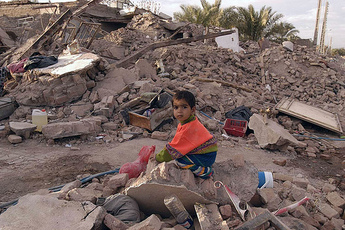 Isobel Braithwaite Published in Outreach magazine at http://www.stakeholderforum.org/sf/outreach/index.php/previous-editions/cop-19/193-cop-19-day-3-climate-change-and-health/11583-climate-and-mental-health-impacts-and-inequalities The health impacts of climate change, and the importance of integrating health into adaptation planning, have become increasingly prominent in recent years - though arguably not prominent enough. For example, there have been several declarations from health organisations – the World Health Organization (WHO) has this year trained a number of Ministers of Health in climate policy, who are attending in their country delegations – and many adaptation initiatives now prioritise the health sector. Often the health impacts which are highlighted are things like heat deaths, malnutrition associated with food insecurity, changing distributions of infectious diseases, such as dengue fever, and the direct deaths and injuries caused by extreme weather events. All are important, and are likely to pose a significant threat to health – especially without an ambitious and equitable global deal, and successfully closing the pre-2020 emissions gap. What is less often considered, but equally important, is that climate change not only affects physical health but also mental health – and is likely to impact on mental health dramatically. It matters because of the immense detriment to people’s wellbeing, and because the other impacts of mental health are wide-reaching. There are knock-on effects on physical health and life expectancy, people’s ability to work and to participate actively in their communities, and of course on healthcare costs. After climate-related disasters such as floods, tropical storms and forest fires, affected communities have been documented to suffer rates of mental health problems such as depression, anxiety and posttraumatic stress disorder (PTSD) many times higher than 'control' communities with similar socioeconomic conditions and baseline levels of mental health. For example, a 2001 study by Dr. Armen Goenjian and colleagues after Hurricane Mitch in Nicaragua found that estimated rates of PTSD and/or depressive disorders in the worst-affected town of their study, Posoltega, reached 80-90%, compared to levels around a third as high in the least severely affected town, Leon. Slow-onset crises, such as those caused by droughts or sea-level rise, can also impact mental health adversely, and uncertainty about the future is a particularly important factor. At present the evidence base on the mental health impacts of disasters is sparse, because of the difficulties associated with conducting rigorous research in disaster contexts, the complexities and ambiguities that surround mental health in general, and the fact that – legitimately – research is not an immediate priority after a major disaster. However, the evidence we do have shows that the effects can last for months to years, and effective strategies exist to support mental health after disasters. This is of course a complex subject but evidence seems to suggest that the best approach is not necessarily to provide counselling for those affected, but instead to focus on resolving the main causes of distress, such as the need for shelter, social support and medical care, and in the longer-term, support to rebuild. The opportunity to rebuild elsewhere, or to migrate, can also be important, including to reduce future risks, and can be a form of adaptation – especially for those affected by sea-level rise or desertification for instance. This issue has not yet been adequately addressed by the UNFCCC framework or other international institutions. Mental health is already a major challenge in global health today, and it is rising. By creating the concept of a 'Disability-Adjusted Life Year' (DALY; comprised of years of life lost and years lived with disability, where weights are applied), the Global Burden of Disease project has enabled us to compare a wide range of conditions in terms of ‘healthy life years lost,’ including those which are generally non-fatal, such as mental health conditions, into priority-setting. According to the latest assessment in 2010, major depressive disorders have risen to become the second highest cause of DALYs lost worldwide; anxiety disorders are close behind. In both women and younger age groups, both rank higher still. Both are also particularly vulnerable to the impacts of climate change, particularly in the poorest communities: climate change creates a doubly uneven playing field for women’s and young people’s mental health. We also know that the levels of mental distress and conditions such as PTSD seen after disasters are influenced by factors such as the severity of the event, the damage caused, the existence of effective relief systems, and access to funds to enable people to rebuild their homes and for communities to recover. As well as strengthening the case for investment in adaptation, this is highly relevant to the ongoing discussions around Loss and Damage at COP 19, and – as the science of climate change grows stronger; the task of mitigating it ever more urgent – it is essential that wealthier countries, who have benefitted from their early industrialisation, support those who have contributed least to climate change to cope with and recover from its’ impacts. More references and links: http://climate.adfi.usq.edu.au/statements/74/
0 Comments
Your comment will be posted after it is approved.
Leave a Reply. |
Details
Archives
February 2019
Tags
All
|
 RSS Feed
RSS Feed
